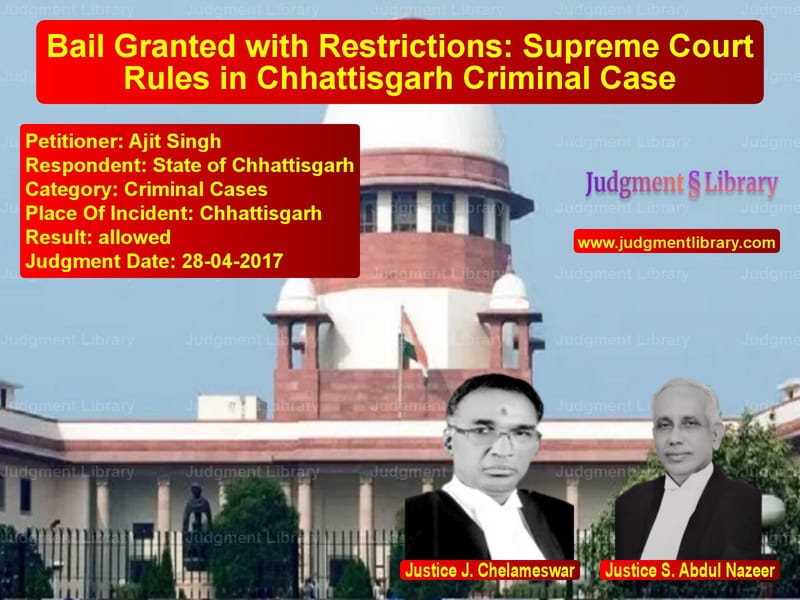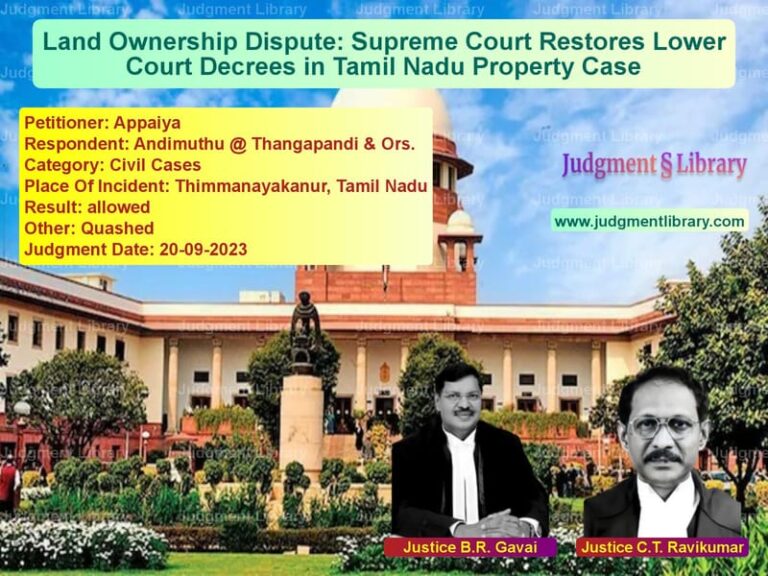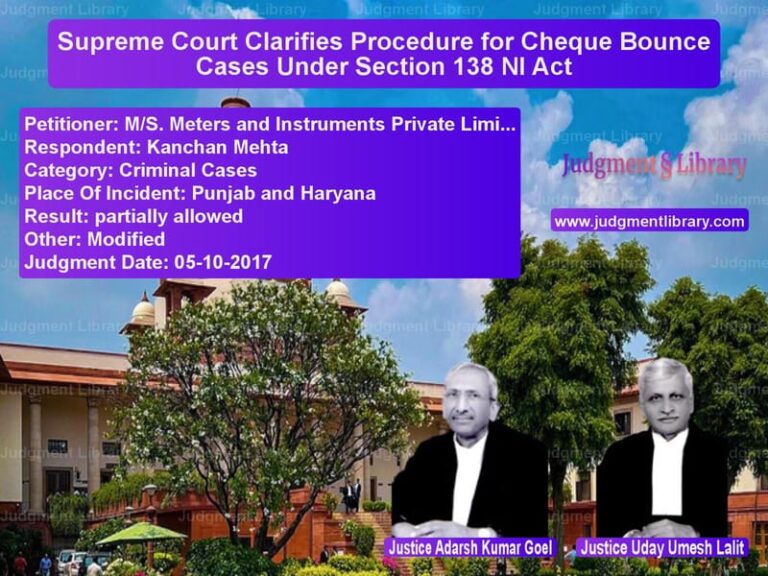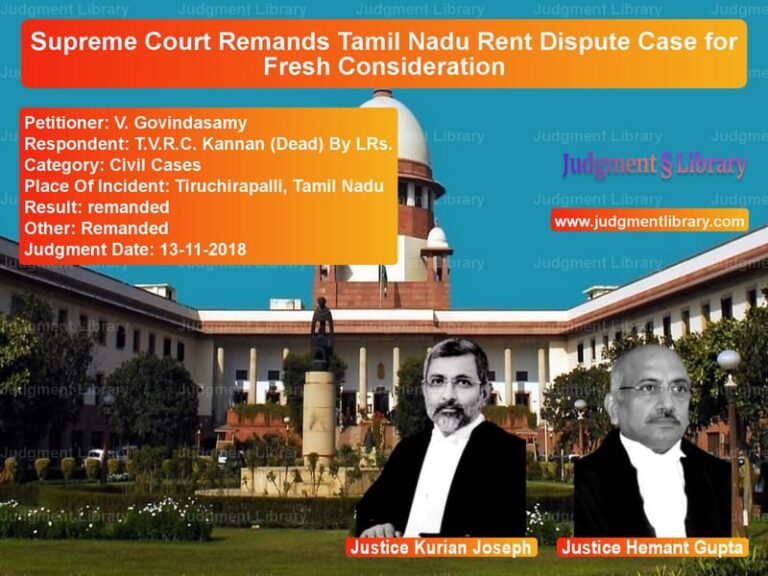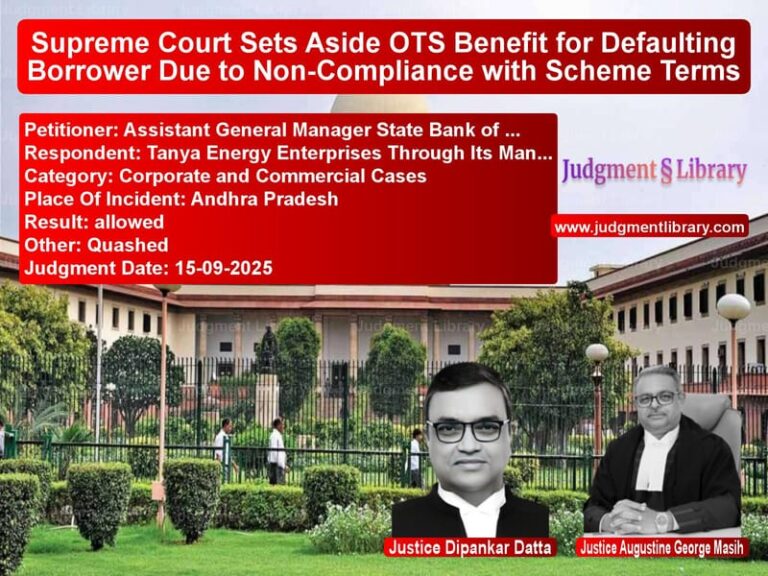Bail Granted with Restrictions: Supreme Court Rules in Chhattisgarh Criminal Case
The Supreme Court of India recently delivered a ruling in the case of Ajit Singh vs. State of Chhattisgarh, granting bail to the accused with strict conditions. This case revolved around serious criminal charges, including allegations under Sections 366, 376(2)(g), 120-B, and 506 of the Indian Penal Code (IPC) and Section 3(2)(v) of the Scheduled Castes and Scheduled Tribes (Prevention of Atrocities) Act. The Court carefully weighed the arguments presented and concluded that bail could be granted under specific conditions to ensure justice while preventing any potential misuse of liberty.
The ruling is significant as it sheds light on the Supreme Court’s approach to bail in cases involving grave offenses. It highlights the balance between personal liberty and ensuring that justice is served, especially in cases where co-accused have already been granted bail.
Background of the Case
The case originated from a complaint registered at Police Station Supela, District Durg, Chhattisgarh. The complaint accused Ajit Singh and four others of committing serious offenses, leading to the registration of Crime No. 865 of 2016. Ajit Singh was arrested on September 28, 2016, and remained in custody while his bail application was rejected by the High Court of Chhattisgarh in MCRC No. 88 of 2017.
Arguments by the Petitioner (Ajit Singh)
The defense counsel, representing Ajit Singh, raised the following key arguments:
- The complaint was allegedly motivated and intended to extort money and property from the accused.
- Ajit Singh had been falsely implicated in the case.
- He had already been in custody for six and a half months, and keeping him detained further was unnecessary and unfair.
- The case against him was similar to that of the other co-accused, who had already been granted bail.
- He was willing to comply with any conditions imposed by the Supreme Court, including staying outside the state of Chhattisgarh during the trial.
Arguments by the Respondent (State of Chhattisgarh)
The prosecution opposed the bail plea, arguing:
- The charges against the accused were of a serious nature.
- Granting bail could interfere with the judicial process and might allow the accused to influence witnesses.
- The trial was still in progress, and releasing the accused could compromise the case.
Supreme Court’s Observations
The Supreme Court considered several factors before making its decision:
“After investigation, final report under Section 173 of the Cr.P.C. has been filed against the appellant and four other persons on 19th October, 2016. The case against the appellant is almost similar to that of other co-accused who have been enlarged on bail.”
“The accused has been in custody for the past six and a half months. No criminal antecedents have been reported against the appellant.”
Final Judgment
The Supreme Court decided to grant bail to Ajit Singh, but with strict conditions to ensure the integrity of the legal proceedings. The conditions imposed were:
- Residence Restriction: Ajit Singh was not allowed to stay in Chhattisgarh during the trial and was directed to reside in Patna.
- Mandatory Reporting: He had to appear before the Senior Superintendent of Police (SSP) in Patna and notify his residence.
- Weekly Attendance: He had to report to the jurisdictional police station in Patna every Sunday between 9:00 AM and 5:00 PM.
- Regular Court Appearances: Ajit Singh was required to personally appear before the trial court on all hearing dates unless unavoidable circumstances prevented it.
- Non-Interference Clause: He was prohibited from tampering with evidence or influencing witnesses.
- Bail Bond: He had to execute a personal bond of Rs. 1 lakh with two sureties of the same amount to the satisfaction of the trial court.
Legal Significance of the Judgment
The judgment underscores several important legal principles:
- Precedent for Bail in Serious Offenses: Even in grave cases, bail may be granted if the accused has already spent substantial time in custody and has no prior criminal record.
- Parallels with Co-Accused: Courts are likely to extend similar relief if co-accused facing the same charges have already been granted bail.
- Use of Conditional Bail: Restrictions like residence bans and weekly reporting ensure the accused’s compliance with legal proceedings while granting them temporary liberty.
- Balancing Individual Rights with Judicial Integrity: The Court ensured that the accused’s rights were not unnecessarily curtailed while also protecting the integrity of the ongoing trial.
Impact on Future Cases
The Supreme Court’s decision in this case sets a crucial precedent for similar bail petitions in cases involving serious allegations. The ruling clarifies that:
- Courts must consider the time already spent in custody when deciding bail applications.
- Accused individuals can be granted bail with strict conditions to prevent any interference in ongoing trials.
- Law enforcement agencies must ensure that all co-accused are treated fairly under similar legal circumstances.
Conclusion
The Supreme Court’s decision in Ajit Singh vs. State of Chhattisgarh reflects the judiciary’s careful balancing of individual liberty and judicial fairness. By imposing strict bail conditions, the Court ensured that the trial process would not be hindered while still upholding the accused’s rights.
This ruling reinforces that bail should not be denied arbitrarily, even in serious cases, if the accused has no criminal antecedents and has already spent significant time in custody. The conditions imposed serve as a safeguard, preventing any misuse of bail privileges while allowing the accused to participate in his defense.
Don’t miss out on the full details! Download the complete judgment in PDF format below and gain valuable insights instantly!
Download Judgment: Ajit Singh vs State of Chhattisgar Supreme Court of India Judgment Dated 28-04-2017.pdf
Direct Downlaod Judgment: Direct downlaod this Judgment
See all petitions in Bail and Anticipatory Bail
See all petitions in SC/ST Act Case
See all petitions in Judgment by J. Chelameswar
See all petitions in Judgment by S. Abdul Nazeer
See all petitions in allowed
See all petitions in supreme court of India judgments April 2017
See all petitions in 2017 judgments
See all posts in Criminal Cases Category
See all allowed petitions in Criminal Cases Category
See all Dismissed petitions in Criminal Cases Category
See all partially allowed petitions in Criminal Cases Category

